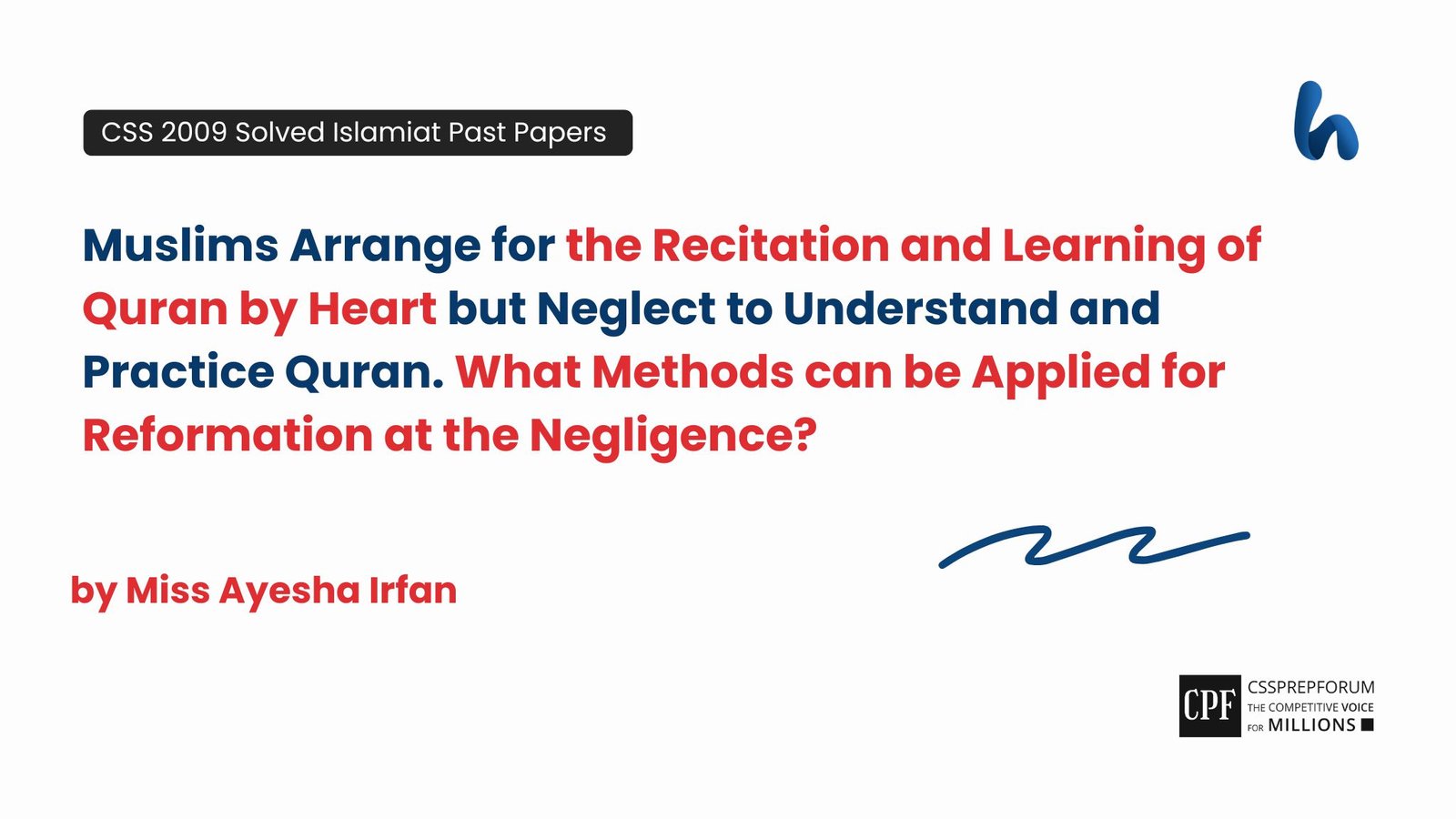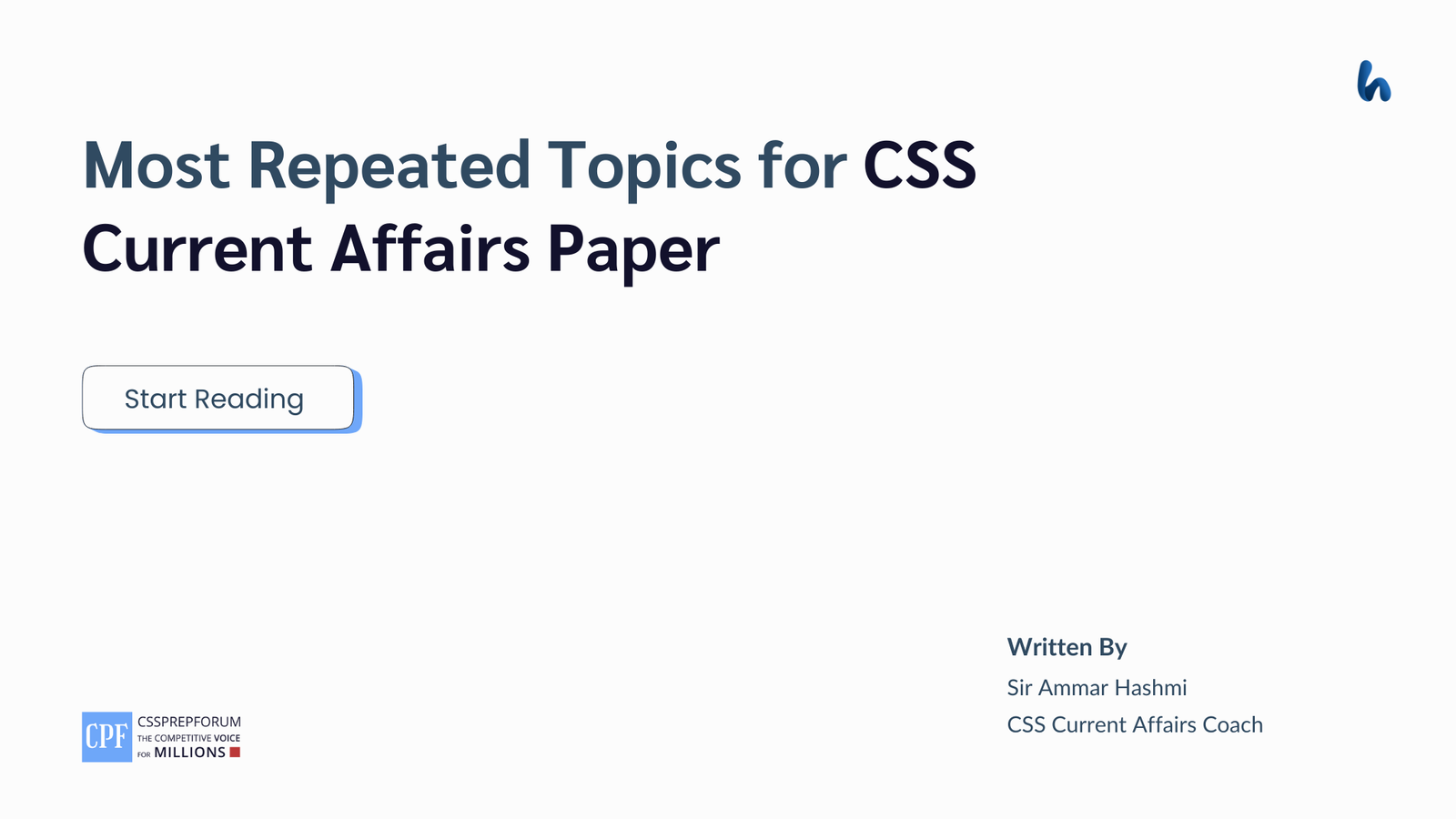The following article is written by Zainab Arshad Cheema, a student of Sir Syed Kazim Ali. Moreover, the article “Why Pakistani Women Not Have the Same Chances as the Men” is written on the same pattern, taught by Sir to his students, scoring the highest marks in compulsory subjects for years. Sir Kazim has uploaded his students’ solved past paper questions so other thousands of aspirants can understand how to crack a topic or question, how to write relevantly, what coherence is, and how to include and connect ideas, opinions, and suggestions to score the maximum.

In the last couple of decades, Pakistani women have undoubtedly witnessed certain improvements in opportunities and rights, backed by the state constitution and Islamic values. However, they are still in the myriad of discrepancies in all socio-economic, political, and legal realms, depriving them of getting the same chances as men. As evident from the recent Economic Survey Report 2023, the male literacy rate stands at 72%, while female lags behind at 51.8%. Moreover, forced marriages, gender-based violence, and the undue pressure on females to choose family over career illustrate the challenges of the country’s women as compared to their counterparts. Similarly, the limited opportunities for jobs, resources, and entrepreneurial activities with the prevalence of the gender wage gap are the bitter reality in society. Furthermore, the discriminatory laws, the unequal representation of women in a federal structure, and the limited influence of women in the decision-making process prove the fact that women do not have the same chances as men in the country. Nevertheless, to improve the graph of gender equality, the government needs to put more effort into lessening the widening gap between men and women in every domain of life. In fact, by dismantling barriers and fostering an environment where women have the same chances as men, Pakistan can harness the full potential of its population. For this, the initiatives for women’s education and empowerment, the enforcement of laws and policies, and the elimination of gender-based discrimination would be the steps in the right direction, providing equivalent chances for both genders to grow.

Why Pakistani Women Not Have the Same Chances as the Men
To begin with, Pakistani women experience a lack of educational rights, owing to the gender disparity in literacy rate as compared to men in society. For instance, as evident from the recent report of the Economic Survey of Pakistan 2022, the male literacy rate stands at 72%, while women lag behind at 51.8% in literacy rate, demonstrating the bitter reality of gender-based constraints. On the other hand, access to educational opportunities can not only provide equal chances of growth to women but also help them play a productive role in the development of society. Thus, addressing this disparity is the need of the time for Pakistan, as it is the investment for a better and enlightened future.
Furthermore, the manifestation of the tradition of forced marriages is the rise of gender-based violence, depicting the harsh reality of unequal women’s rights in Pakistan. For demonstration, according to the report of the National Commission for Human Rights (NCHR), gender-based violence has been reported with a surge over the past three years, with 63,000 cases, including 80% of these cases were related to domestic violence, while some 47% pertained to domestic rape and sexual abuse. These injustices underscore the glaring disparity in the treatment of women compared to their male counterparts. Thus, illustrating the fact that women have unequal opportunities and addressing this issue head-on is pivotal for promoting gender equality and fostering societies where women can thrive as equals, contributing meaningfully to every facet of life.
Moreover, there is undue pressure on women in terms of taking care of family and sacrificing their careers owing to social or financial pressures. Nevertheless, the country has observed various good opportunities and initiatives to uphold the gender role, but it has a lot more to do in order to gain gender-based equilibrium. As per the 2022 report by the World Bank, females constitute only 20% of total participation; this is because removal, in our culture, takes a career break of 2-3 years while they raise kids. Thus, to equalize women in Pakistan to men, there is a need to mobilize literate women towards stabilizing their careers after marriage.
Additionally, the limited opportunities for jobs, resources, and entrepreneurial activities severely undermine women’s right to financial independence. This stark reality, prevalent in numerous societies, restricts women’s economic empowerment and perpetuates gender inequality. In fact, when women face barriers in accessing job opportunities, they are denied the chance to contribute meaningfully to the economy, hindering their financial self-sufficiency. For instance, women are persistently less present in the labour market, which is a red flag indicating the extremely limited ‘real’ economic opportunities available to women in Pakistan. About 51% of the Pakistani population is comprised of women, yet, as of 2022, they form only 22% of its labour force. Thus, Keeping in mind the cultural context where men are regarded as the breadwinners who are providing shelter, security, and cash for household expenditure, whereas women are seen as homemakers, taking care of the house and children, the job market needs to be more accommodating and flexible.
Going down the ladder, the persistent gender wage gap is a clear testament to the economic disparity faced by women in the country. Despite advancements in various sectors, women continue to earn significantly less than their male counterparts for similar roles. For demonstration, data from various rounds of the Labor Force Survey (LFC) of Pakistan suggests that wage inequality (measured by the Gini index) has increased by six percentage points, from 35% in 1991 to 41 % in 2018. This glaring inequality not only undermines the principle of equal pay for equal work but also perpetuates a cycle of financial disadvantage for women. The gender wage gap reflects deep-rooted biases and discriminatory practices within the workforce, where women are undervalued and under compensated. This disparity not only affects women’s immediate financial well-being but also has long-term consequences, such as limited savings, reduced investments, and a diminished ability to plan for the future. Addressing the gender wage gap is not just a matter of economic justice; it is crucial for social progress. Closing this gap is essential for empowering women, promoting economic equality, and fostering a society where individuals are valued based on their skills and contributions, irrespective of gender. Ensuring equal pay is not just a women’s issue but a fundamental human rights imperative necessary for building a fair and equitable society for all.
Similarly, discriminatory laws and policies, particularly concerning divorce and inheritance, highlight a deep-seated gender bias that unjustly affects women. In many societies like Pakistan, archaic legal frameworks perpetuate inequalities, leaving women vulnerable and financially disadvantaged. Divorce laws often favour men, granting them more rights and advantages, leaving women financially dependent even when the marriage dissolves. As it is evident, divorce laws in our country do not treat men and women with even the faintest trace of parity. While both are subject to going through arbitration councils, women must bear an additional burden, facing the physical, emotional and financial cost of having to go through an entire judicial obstacle course to achieve the same result. This legal disparity not only infringes upon women’s basic human rights but also hampers their ability to achieve financial independence and social equality. Thus, overcoming these injustices isn’t just about empowering women; it’s about fostering a society that respects the rights and dignity of every individual, regardless of gender.
In the same way, the stark underrepresentation of women within the federal structure serves as a glaring indicator of the deep-seated societal constraints imposed upon them. In the corridors of political power, the conspicuous absence of women not only reflects historical gender biases but also perpetuates a systemic inequality that undermines the very essence of democracy. For demonstration, In the World Economic Forum’s Global Gender Gap Report 2023, Pakistan’s widest gender gap is on political empowerment (15.2pc). The number of women in decision-making posts in political parties or in government is minimal. Such constraints not only limit the potential of half the population but also hinder the evolution of progressive and inclusive policies. To rectify this injustice, it is imperative to challenge these societal constraints head-on. Thus, Embracing diverse voices within the political sphere is not just a democratic necessity; it is an ethical imperative crucial for fostering a society where gender is not a barrier to equal participation and influence.
Last but not least, the marginalization of women’s issues in political agendas poses a significant barrier to women’s active participation in the decision-making process. In fact, this sidelining occurs due to deeply ingrained societal norms and traditional gender roles that have historically downplayed the importance of women’s perspectives. As a result, policies and decisions that profoundly impact women’s lives, such as healthcare, education, reproductive rights, and economic opportunities, are frequently crafted without their meaningful input. One of the key consequences of this marginalization is the limited representation of women in political offices. When women’s issues are not given priority in political agendas, it discourages women from actively engaging in politics. Thus, the lack of female representation in decision-making bodies further perpetuates the cycle of exclusion, as policies that could empower women or address their specific challenges are often neglected.
Consequently, ensuring equal educational and skill development opportunities for Pakistani women is pivotal for dismantling gender disparities. By investing in accessible and quality education for girls, the country can empower them with the knowledge and critical thinking skills necessary for leadership roles. Moreover, the Scholarships and educational initiatives tailored for women, especially in STEM fields, bridge the gender gap in traditionally male-dominated professions. Similarly, the governmental initiatives for vocational training programs equip women with practical skills, enhancing their employability and entrepreneurial ventures. When women have equal access to education, they become architects of change, shaping diverse fields, including politics, with their expertise. Thus, by eliminating educational barriers, the country can tap into a vast reservoir of talent, fostering the generation of informed, skilled, and empowered women ready to participate actively in decision-making processes.
In order to bridge the gap, emphasizing and implementing initiatives that uphold the legal and political rights of women are essential steps toward fostering gender equality in the country. In fact, Strengthening laws against gender-based violence and workplace discrimination creates safer environments for women, ensuring their active participation without fear. Similarly, the implementation of policies, such as quotas in political positions, breaks systemic barriers, providing women with the representation they deserve. Moreover, awareness campaigns and training programs inform women about their rights, encouraging their involvement in political activities. Therefore, Supporting and amplifying women’s voices in politics validates their perspectives, leading to more inclusive policies and fostering democratic values and equitable representation for all.
Ensuring equal economic avenues for females in Pakistan is crucial for promoting gender equality and empowering women financially. By providing women with opportunities for entrepreneurship, employment, and skill development, they can attain financial independence, breaking free from traditional constraints. Access to credit facilities, vocational training, and business mentorship programs are essential components of this empowerment process. When women have equal access to economic opportunities, they contribute significantly to the country’s economic growth. Financial independence not only enhances their self-esteem and decision-making power within families but also leads to a more inclusive and prosperous society. Empowering women economically is not just a matter of equality; it’s an investment in the overall development of Pakistan.
In a nutshell, the disparity in opportunities between Pakistani women and men across educational, social, and political domains is a stark reality. However, this inequality is not insurmountable. Through dedicated and strategic measures, such as ensuring equal access to education, promoting women’s participation in social and economic activities, and implementing policies that enhance their representation in political spheres, these gaps can be significantly lessened. In fact, empowering Pakistani women is not just a matter of social justice; it is a pathway to national progress. Thus, by dismantling barriers and fostering an environment where women have the same chances as men, Pakistan can harness the full potential of its population. Therefore, the journey toward gender equality requires collective effort, policy reforms, and a shift in societal attitudes to build a more vibrant Pakistan where every individual has the chance to thrive.

CSS Solved Past Papers’ Essays
Looking for the last ten years of CSS and PMS Solved Essays and want to know how Sir Kazim’s students write and score the highest marks in the essays’ papers? Then, click on the CSS Solved Essays to start reading them.
CSS Solved Essays
CSS Solved General Science & Ability Past Papers
Want to read the last ten years’ General Science & Ability Solved Past Papers to learn how to attempt them and to score high? Let’s click on the link below to read them all freely. All past papers have been solved by Miss Iqra Ali & Dr Nishat Baloch, Pakistan’s top CSS GSA coach having the highest score of their students. General Science & Ability Solved Past Papers
Articles Might Interest You!
The following are some of the most important articles for CSS and PMS aspirants. Click on any to start reading.












